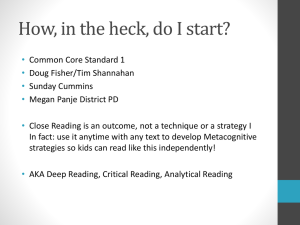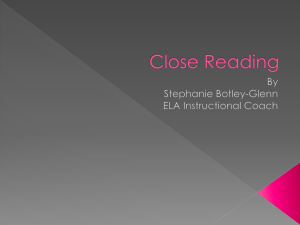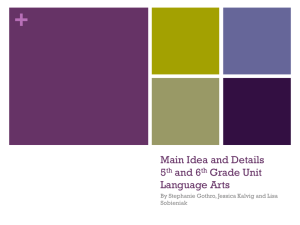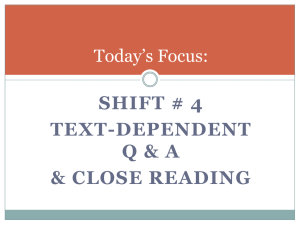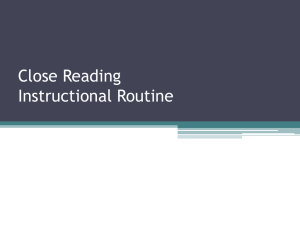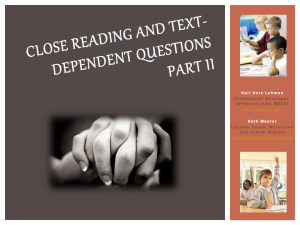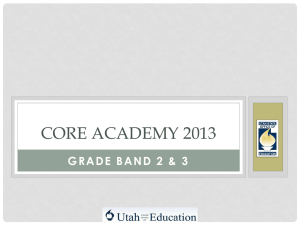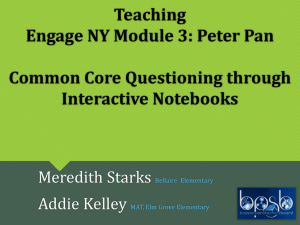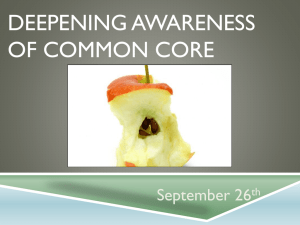Webinar 1 PowerPoint on Text
advertisement
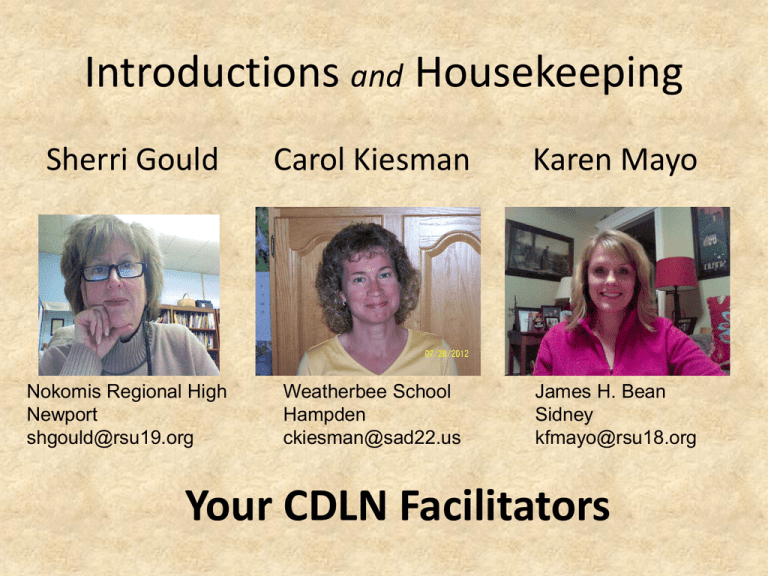
Introductions and Housekeeping Sherri Gould Carol Kiesman Karen Mayo Nokomis Regional High Newport shgould@rsu19.org Weatherbee School Hampden ckiesman@sad22.us James H. Bean Sidney kfmayo@rsu18.org Your CDLN Facilitators Text-Dependent Questions Webinar #1 Agenda Welcome and Overview of Procedures • About Text-Dependent Questions • Close Reading and Text Dependent Questions • Creating Text-Dependent Questions • Next Steps Outcomes for Today's Session By the end of today’s webinar, you will • be able to define text-dependent questions and explain their importance; • be able to define close reading and explain its importance; • be able to create quality text-dependent questions. About Text-Dependent Questions What are text-dependent questions? Why are text-dependent questions so important? About Text-Dependent Questions What does the Common Core State Standards have to say about text-dependent questions? What do text-dependent questions ask of students? Defining Close Reading What is close reading? --an instructional strategy --an analysis of complex text --an examination of text structure Considerations for Close Reading Length of text Type of text Complexity of text Amount of frontloading Number of readings Annotating the text Types of questions Close reading and the Common Core State Standards Consider the following . . . Why is close reading an essential instructional strategy for all? Creating text-dependent questions Why did the North fight the Civil War? Have you ever been to a funeral or a gravesite? Why is equality an important value to promote? Building Text-Dependent Questions Building Text-Dependent Questions *Does the student have to read the text to answer the question? *Is it always clear to students that they MUST use evidence from the text to support what they say? Student-friendly language Coherent organization Building text-dependent questions The first three words of the Constitution are the most important. They clearly state that the people—not the king, not the legislature, not the courts—are the true rulers in American government. This principle is known as popular sovereignty. But who are “We the People”? This question troubled the nation for centuries. As Lucy Stone, one of America’s first advocates for women’s rights, asked in 1853, “‘We the People’? Which ‘We the People’? The women were not included.” Neither were white males who did not own property, American Indians, or African Americans—slave or free. Which words in the Constitution are most important? Who was Lucy Stone? When did she live? What important question did she ask? What do you think ‘popular sovereignty’ means? Building text-dependent questions The first three words of the Constitution are the most important. They clearly state that the people—not the king, not the legislature, not the courts—are the true rulers in American government. This principle is known as popular sovereignty. But who are “We the People”? This question troubled the nation for centuries. As Lucy Stone, one of America’s first advocates for women’s rights, asked in 1853, “‘We the People’? Which ‘We the People’? The women were not included.” Neither were white males who did not own property, American Indians, or African Americans—slave or free. Why would the author begin the second paragraph with a question? Why has that question troubled the nation for hundreds of years? Whose story was not represented in the early days of the Constitution?Whose story was represented? Monk con’t Justice Thurgood Marshall, the first African American on the Supreme Court, described the limitation: For a sense of the evolving nature of the Constitution, we need look no further than the first three words of the document’s preamble: ‘We the People.’ When the Founding Fathers used this phrase in 1787, they did not have in mind the majority of America’s citizens . . . The men who gathered in Philadelphia in 1787 could not . . . have imagined, nor would they have accepted, that the document they were drafting would one day be construed by a Supreme court to which had been appointed a woman and the descendant of an African slave. What does Marshall mean by “ the evolving nature of the Constitution” in the first line of the quotation? Explain why Justice Marshall and Lucy Stone might agree on the importance of the Constitution to all American people? Text-dependent questions are *questions worth asking; *questions that lead students to think critically; *questions that propel students to build knowledge and understanding. Next Steps How can I revisit our learning today? When is our next webinar? How should I prepare for it? Want to continue today’s conversation? http://mainelearning.net/groups/cdln-textdependent-questions/ Online Survey Contact Hours Want to get your contact hours for today’s webinar? https://www.surveymonkey.com/s/cdlnwebinars-session3
